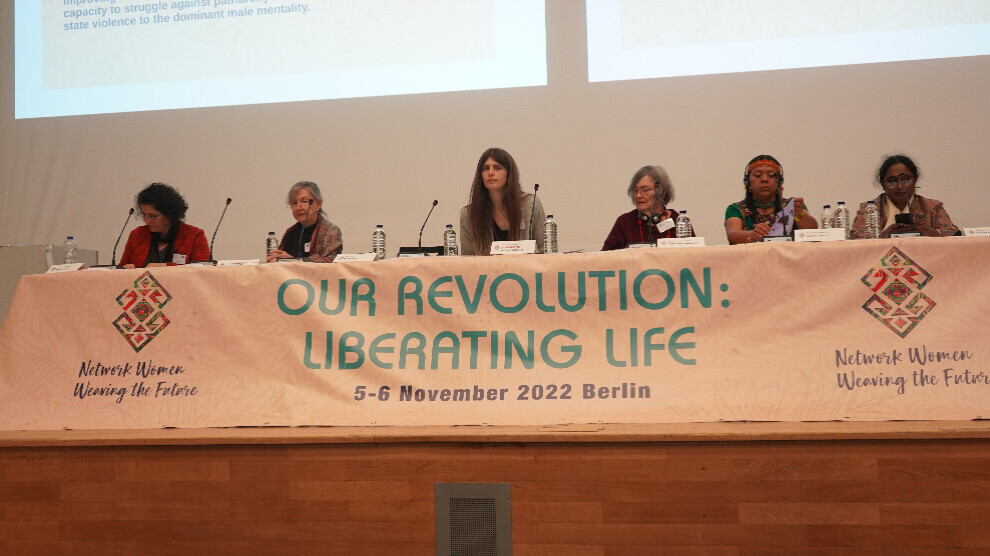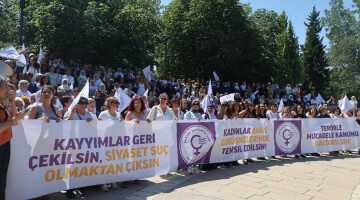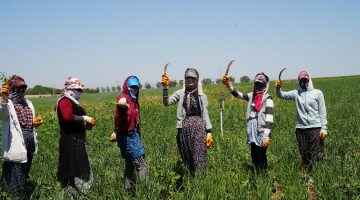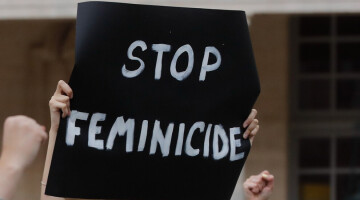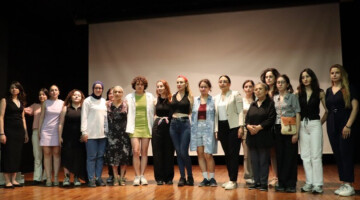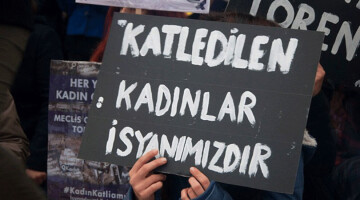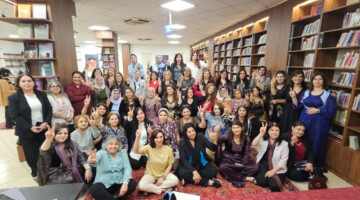The 2nd International World Conference on Women began in Berlin today. Around 700 women and other oppressed genders from all over the world have travelled to Berlin to participate in this powerful and revolutionary coming together.
In terms of content, the conference started with a deep examination of the Third World War as well as the resistance against it. Specifically, it was about the struggle against the highly armed capitalist patriarchy. Meghan Bodette of the Kurdish Peace Institute moderated and posed the following questions to the first session: What can the revolutionary liberation struggle of women and other oppressed genders do in this age of pandemics, wars, violent land grabs and ecological crises? The oppressive capitalist patriarchy continues its war against women and all other oppressed genders, developing ever new methods and strategies to break women's resistance and trying to hide all the contradictions of the system. How are women and other oppressed genders around the world currently resisting this capitalist patriarchy and what does it take for this movement to gain strength?
In the first part of the panel discussion, Nilüfer Koç, member of the Kurdistan National Congress (KNK), and Mariam Rawi from the Revolutionary Association of the Women of Afghanistan (RAWA) spoke about state violence against society as well as women and the means of oppression - dominant masculinity.
"Now is the right time to shape the future"
Koç stressed that now is exactly the right time to talk about how we as women should shape the future. “After all, what is happening around us right now is nothing less than World War III - even the US, NATO, etc. agree on this. But as women, we should not make the mistake of thinking of war only in military terms. There is a war that is not named as such: since the beginning of patriarchy, feminicide has been a war and an inherent part of capitalism. Military wars are only masks to disguise the relations and origins of the problems. That is why it is so necessary to find alternatives in this century. We as women need our own ideology - that of women's liberation,” said Koç and called for engagement with women's movements that are actively fighting for peace. She said that equal principles are needed to work together and create a global connection between women.
Koç went on to discuss the current crises, the hegemonic claims of the states and the resulting wars and competition. She mentioned collaboration at this point to destroy alternatives, such as in the fight against the Kurdish freedom movement and the attacks on Kurdistan. “At this moment, the oppressed have the chance to contradict and resist. In Iran, this is currently visible again. Behind the slogan "Jin, Jiyan, Azadî" (Woman, Life, Freedom) is a decades-long struggle that shows: if we are organised, we can win battles. In Kurdistan, we show that this is possible. It is time that we as sisters take responsibility for the future. Woman, Life, Freedom! That's how we will win."
"Women are proving that they are writing the history of the revolution”
Mariam Rawi then spoke of Afghanistan as a place where the most brutal religious fascists are currently ruling. She impressively described the tragedy that is taking place under this Islamist fundamentalist mentality. This is a force directed against women. Atrocities and women's suffering are the order of the day under this regime. Women are not recognised as human beings, but are reduced to child-bearing machines, she said.
However, Rawi also stressed that the Taliban were not alone, but linked to the institutions of capitalist states, such as the CIA. She gave a brief outline of the history of this cooperation. For example, she said, "women's rights" were used to legitimise the intervention after 2001, but even if today there is talk of its failure, in fact everything went according to the imperialist plan. Today, the country is on the verge of collapse, yet Western governments maintain relations with the Taliban: strategic interests are far more important than the fate of Afghan women and men, she noted.
But, she continued, people have also learned: values can only be fought for by the oppressed themselves - and then they will no longer be taken away. She went into detail about the work of RAWA: for more than 40 years they have been raising awareness of injustices and clandestinely organising women. For their work, the organisation was recently awarded the Sakine Cansiz Prize. "We were very happy about that."
Rawi concluded by saying, "We hope that the network of solidarity will become stronger and stronger. We swear by the blood of the struggling women to continue their journey. Women are proving that they are writing the history of the revolution."
Ecocide: overcoming domination, dispossession, oppression
The second part of the morning was dedicated to the destruction of nature and was entitled "Ecocide: overcoming domination, dispossession, oppression: the subordination and colonisation of nature and the ruthless appropriation and exploitation of resources". Here, Lolita Chavez from Feministas Abya Yala from Guatemala and Ariel Salleh, a sociologist and ecofeminist from Australia spoke.
From Abya Yala to Kurdistan
Chavez started her speech by lighting a fire and spoke words of gratitude for the earth, the cosmos: "This is our fire, our feminist fire, from Abya Yala to Kurdistan." She positioned herself against the war in Kurdistan and the use of chemical weapons, saying they were defenders of life.
She told of the occupation of indigenous territories, the exploitation and violence of criminal networks and terrorising structures. She stressed that these were also financed by Europe and its institutions: "We are here, telling you in your eyes: you are part of it." She spoke of the war that the extractivist companies were waging against them because they were holding their worlds against them, alternatives that were possible in their territories.
"Stop transnational corporations where they are born"
Chavez also denounced feminicide and called for justice. As feminists from Abya Yala, she said, they would work together, weaving autonomy and self-determination, but also sharing their wisdom. "We are not ashamed when they say we are witches. We stand by our spirituality. We are against ideologism because in our territories we decide."
Chavez ended her speech with two appeals. One, she said, was that there was now no time to delay the important project any longer: "Let's form these feminist networks and weave feminism from below!" Secondly, she called for, "Stop transnational corporations where they are born! Extractivist corporations are the wrong answer to global warming. And we will stop them!"
Overcoming dualist thinking
Ariel Salleh began her presentation by addressing the Rojava revolution, describing it as ecofeminist. She stressed that feminism and ecology denote a common struggle and are intertwined. She called for a struggle to be waged against the perpetuation of constructed dualisms and associated dissociative linkages. “The created dualistic thinking, for example between human beings and nature and linked to that of man and woman, not only limits our possibilities, but also leads to negative consequences, e.g. by portraying one side as inferior or opening the doors to colonialism. Humanity, reason, production are diametrically opposed to nature, chaos, reproduction and dominate them. This hierarchy is institutionalised in patriarchy. A lot of energy is needed to maintain male domination, which means alienation from life itself. Ecofeminists know about this connection with violence against women, and Abdullah Öcalan is also aware of this,” she said, and concluded by talking about successful ecofeminist struggles and emphasising her solidarity.
"Making Invisible Work Visible”
Concluding the first session, the third part focused on "Making Invisible Work Visible: The survival of the system is based on women's bad and unpaid work." This addressed the question: how can we base our class struggle on the principle of women's liberation to fight the foundations of capitalist exploitation? Women in class struggles have developed a view that the class hierarchy and the state are built on the exploitation of women's bodies and services. Under current capitalist conditions, women's labour is even more exploited and made even more invisible.
Abolish the system, not the human being
Genevieve Vaughan, an Italian American peace activist, feminist and philanthropist, made it clear in her lecture that the capitalist economy of the last centuries must be fundamentally abolished. “In order to push for a radical change of the economic system, we would have to understand unpaid labour as the standard of the system and paid labour as its deviation. Only then would we be able to see how women's bodies are exploited in capitalist patriarchy. Humans are the only species that cannot sustain themselves, but only stay alive by caring for each other. The maternal gift, she said, is invisible in the capitalist economy. This gift includes the creation of life and care, she noted.
Misogyny has historically kept women out of science and this has laid the groundwork for always developing models that would have voids in their analysis. We have to realise that we don't want the system to survive, we want our human species to survive. And our species consists of humans, who are neither Homo Economicus, i.e. profit-oriented, nor Homo Sapiens, i.e. knowledgeable, because we do not know who we are. The human being is a homo Donando, a giving human being.
Real security does not come from capitalist patriarchy
"Azadi means freedom in many languages" - with these words Kavita Krishnan, feminist activist of the All India Progressive Women's Association, began her contribution. She made it clear that in patriarchy the word security is used as a code for control and exploitation of women. To illustrate this situation in the system, Krishnan gave various examples from India and China to illustrate this shift in terms as a strategy to oppress women. In one example, she discussed the situation of young women who are recruited to work in factories of multinational companies. The managers promise the families that their daughters will work in safety, while their wages are only paid after three years. Even their mobile phones are partly taken away from them. Krishnan asked what kind of security is actually at stake. The security that should be at stake, she said, is one that should give protection from employers. The employer, however, becomes an ally of the family by de facto restricting women's freedom and preventing them from forming relationships with men outside their caste, from organising themselves, etc.
Krishnan stressed how important it is for feminist solidarity to be critical of supposedly anti-imperialist regimes. We must not close our eyes just because regimes claim to be anti-US. The same regimes, she said, understand LGBT struggles and feminism as Western values to be fought against.
The first session ended with an engaging Q&A session and many powerful expressions. There were repeated slogans and applause from the audience.

